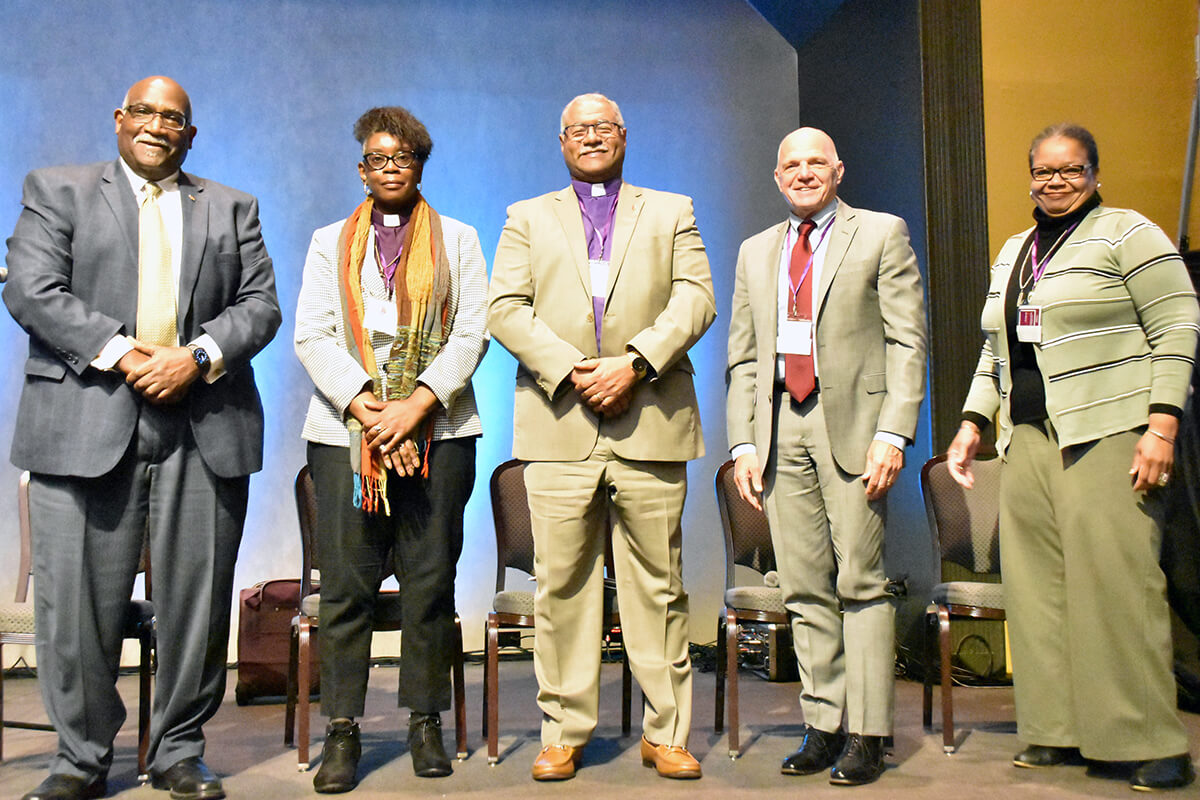Key points:
- Black Methodists for Church Renewal gathered for its yearly General Meeting March 6-9 in Cincinnati.
- Members surveyed a challenging landscape of denominational concerns, including budget cuts, disaffiliations and regionalization proposals.
- Advocacy for empowerment in church and society was a key focus during the meeting, which was themed “Self-Actualization: Our Faith, Our Family, Our Future.”
At a time of deep conflict in church and society, United Methodism’s Black membership caucus returned to the site where it was born 57 years ago and invoked the biblical hero Nehemiah, who returned to his native Jerusalem determined to rebuild its walls that lay in ruins.
Black Methodists for Church Renewal gathered for its yearly General Meeting March 6-9 in Cincinnati. Members surveyed a challenging landscape of denominational concerns. And they considered social and spiritual remedies prescribed in oratory, instruction, legislative advocacy, and impassioned worship and Bible study.
The more than 200 attendees heard and engaged in Q&A with a procession of featured speakers and guest presenters, interspersed with stirring music from a small choral ensemble and the customary caucus reports, elections, jurisdictional meetings, fundraising, tributes and other business.
The most-discussed church concerns included:
- Legislative uncertainties of General Conference, scheduled for April 23 to May 3 in Charlotte, North Carolina — especially proposed reductions in funding for ongoing initiatives that support racial-ethnic churches, higher education and leadership development;
- Disaffiliation of many congregations and pastors;
- Decline in church budgets, ministries and pastors to lead churches; and
- Groundbreaking regionalization proposals that offer greater self-determination and parity for each geographical region, including Africa.
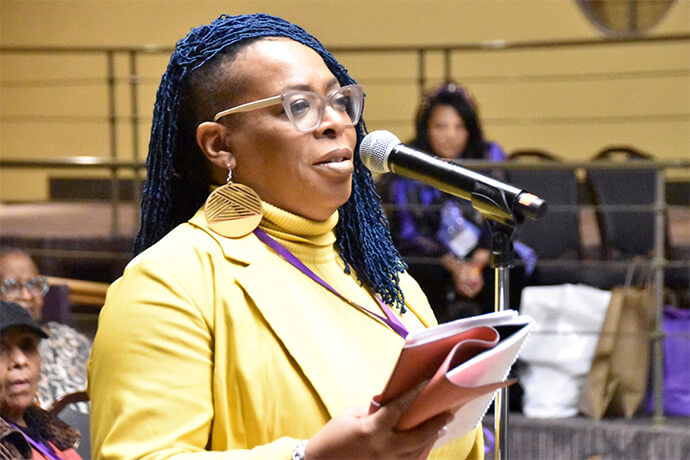
The Rev. Antoine Love, outgoing caucus chairperson, invoked the meeting’s theme, “Self-Actualization: Our Faith, Our Family, Our Future,” as BMCR’s key goal and values. He called on members to pursue “our highest need and fullest potential” while withstanding obstacles and opposition.
“We need to press on, doing the work God has given us, staying faithful and focused like Nehemiah.”
West Ohio Conference Bishop Gregory Palmer, episcopal host of the meeting, preached during the first night’s Communion service. He appealed to listeners to not only stay faithful in the toughest of times but also to understand, as the Apostle Paul teaches, that the Christian faith is a gift from God to be shared with all.
Subscribe to our
e-newsletter
“The Lord’s Supper honors Jesus Christ’s atonement for all,” he said. “We are too hung up on morality clauses, the purity police and holiness enforcers … God knows none of us are right.”
Warning that to “disregard the body…(and) ignore the fate of God’s people” is the one sin that defies Christ’s sacrament, the bishop urged United Methodists to focus not so much on saving the institutional church but on saving the world. Like other speakers, he particularly urged members to vote and help others to vote on Election Day in November.
Also attending the meeting were four other bishops: Julius C. Trimble of the Indiana Conference; Delores Williamston of the Louisiana Conference; Robin Dease of the North Georgia Conference; and John Schol of the Greater New Jersey and Eastern Pennsylvania conferences.
Both Williamston and Dease were elected in 2022. Williamston is the first Black female bishop elected in the South Central Jurisdiction, and Dease is the second Black female bishop elected in the Southeastern Jurisdiction.
Meanwhile, Bishops Palmer, Trimble and Schol will retire in 2024. BMCR honored the men for their many years of episcopal presence and leadership at its general meetings.
When Palmer moderated a bishops’ panel discussion, the five leaders seemed to be in general agreement about various church concerns and desired outcomes for General Conference. Their mutual desires included:
- Removing “harmful language” from the Book of Discipline.
- Focusing on the church’s mission and building closer connections in communities, rather than getting caught up in the mechanisms of the church.
- Working to end hunger and homelessness worldwide.
- Giving the local church “more loving attention” as the primary place to fulfill mission.
- Transforming the episcopacy to increase bishops’ “teaching role” as spiritual leaders and relieve them of so many administrative, problem-solving burdens.
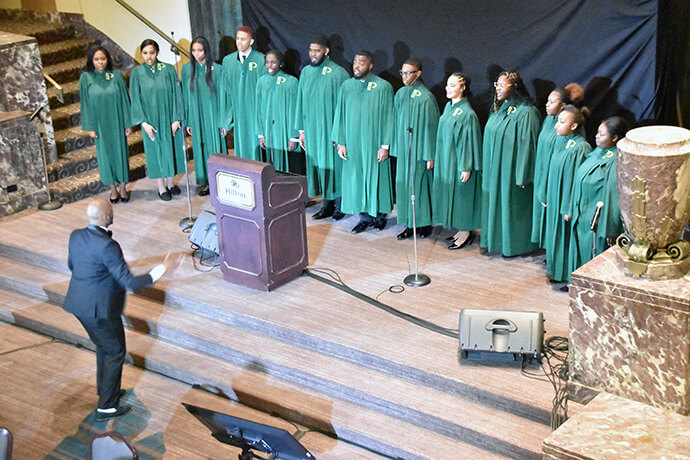
‘Deconstruct American Methodism’s superiority’
Palmer asked his peers what should be “deconstructed” to make needed, substantive changes in The United Methodist Church. Several bishops cited complexities of church polity that should be simplified.
Meeting highlights
Here are some of the other highlights from the Black Methodists for Church Renewal meeting:
- The traditional Black College Fund luncheon, featuring music by the Philander Smith University Choir and a speech by Cynthia Bond Hopson, interim university president.
- A presentation by Wespath staff on proposed clergy pension policy changes based on General Conference legislation and new benefits support services.
- A teaching session on “Self-Care through the Eyes of Jesus,” presented by Dr. Camisha Chambers, executive director of Fellowship of United Methodists in Music and Worship Arts.
- A strategy session led by the Rev. Emmanuel Cleaver III, pastor of St, James United Methodist Church in Kansas City, Missouri, on “Navigating the United Methodist System” to address declining ministries and membership, among other problems.
- And a two-day, prophetic Bible study led by the Rev. Peter Matthews, pastor of McKinley United Methodist Church in Dayton, Ohio.
“The Book of Discipline should contain only things that can be applied anywhere in the world,” answered Schol, a view in line with proposals to fully regionalize the denomination and make its legislative assembly and general rulebook less U.S.-centric.
Williamston added that the church’s spectrum of viewpoints is too narrow. “Too many voices are missing from our conversations, and they need to be heard,” she said.
“We need to deconstruct American Methodism’s superiority,” Dease said. “The global side of our denomination has something to teach us, and we need to listen.”
For the second consecutive year, BMCR heard from the denomination’s global side in a keynote address by the Rev. Lloyd Nyarota of Zimbabwe, who is general coordinator of the United Methodist Africa Forum, an advocacy group formed in 2023. Africa University vice chancellor the Rev. Peter Mageto addressed BMCR’s 2023 General Meeting.
“We in the Africa Central Conference said, ‘Who can we identify closely with that has lived with the (racial) dynamics of this denomination? Our brothers and sisters in BMCR,’” said Nyarota. “So, we began building relationships with all the racial-ethnic caucuses. But we deliberately avoided political caucuses like Good News, the WCA (Wesleyan Covenant Association) or UMCNext — whether they are progressive, centrist or conservative.
“We formed the Africa Forum because some African leaders were leaning toward leaving the denomination to join the new (Global Methodist Church) denomination,” said Nyarota, who noted Africa’s endurance of previous divisions in Methodism since the 1800s. “We wanted to support the leadership of our bishops, as they lead United Methodists in Africa into the future as United Methodists.”
Nyarota, a former secretary general of the Africa Central Conference, sought BMCR’s support for Africa’s needs but especially for regionalization — particularly for the Christmas Covenant, which central conference leaders introduced in 2019. It would reorganize U.S. annual conferences and central conferences in Africa, Europe and the Philippines into regional conferences equal in their decision-making authority and culturally contextual in their rules and policies.
During the meeting, BMCR members passed a resolution from its board of directors advocating support for the Christmas Covenant’s vision of regionalization because it “resonates deeply with BMCR’s mission, vision and purpose … and endeavors to dismantle the dominance and control of the U.S. church, fostering a more unified body of Christ on a worldwide mission.”
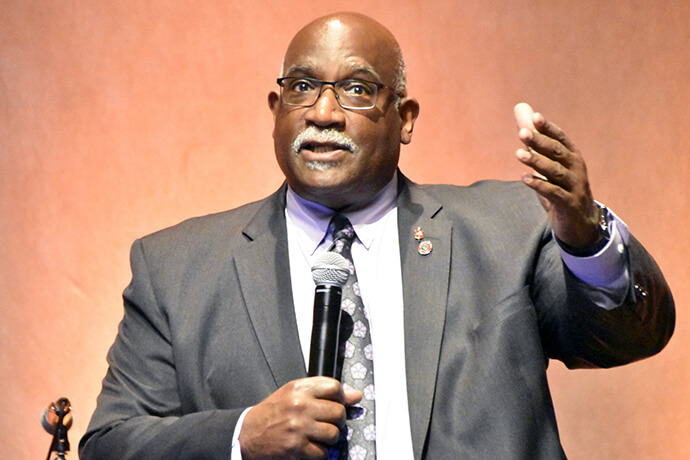
Advocacy for empowerment in church and society
The Rev. Giovanni Arroyo, who heads the United Methodist Commission on Religion and Race, led a session examining General Conference legislation and budget proposals that are relevant to BMCR’s concerns. His report on the General Council on Finance and Administration’s recently increased reductions in its 2025-2028 proposed spending budget prompted expressions of alarm, especially for the fate of the denomination’s five racial-ethnic plans and initiatives, the Black College Fund and Africa University.
“How do we, as people of color, not fall into the trap of following a white (cultural) paradigm of mission and ministry in our deliberations at General Conference,” he asked. “How do we center the voices of our central conference delegates and U.S. delegates of color to be heard and understood?”
Arroyo also promoted legislation to promote disability ministries, a denominational concern supported by the Commission on Religion and Race. “In reality, we should all have an intersectionality framework in our minds that connects our concerns about race, gender and disability,” he said.
He introduced the Rev. Denise Smartt Sears, director of leadership development and accountability for the United Methodist Commission on the Status and Role of Women, who explained proposed legislation to address the problems of sexual misconduct and use of pornography in the church.
Along with church concerns addressed during the meeting, the top social concern was the need for more Black churches to help more Black citizens vote for local, state and national candidates in their November elections. Several speakers addressed that need, including leading voting rights activist Stacey Abrams of Atlanta.
In the meeting’s closing address, she described Nehemiah as a timely political story about building walls to protect the vulnerable from warring factions who seek to determine the destiny of “those who are told they aren’t important enough to make decisions for themselves.”
She recalled early Black Methodist history when “we were seated inside a church that did not always see us.”
Abrams credited her parents, the Revs. Robert and Carolyn Abrams, both retired United Methodist clergy originally from Mississippi, with teaching her that “we have a responsibility especially in election years to remind people of who we are and whose we are, and more importantly, what we are entitled to in this our nation.”
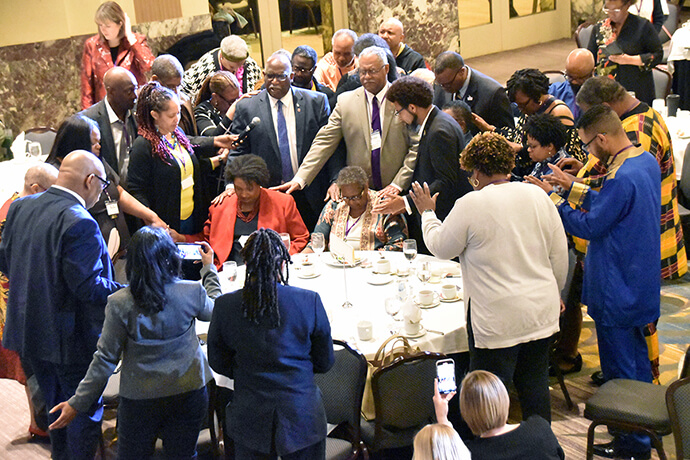
After a decade in the Georgia House of Representatives, including six years as the Democratic party’s minority leader, Abrams made history by running for governor in 2018. She launched a voter education and registration campaign and won more gubernatorial votes than any other Democrat in Georgia’s history. She later became the first Black woman and first Georgian to deliver a minority party’s national response to the President’s State of the Union Address.
In a call to action for the 2024 elections, Abrams challenged BMCR members to do three things in response to evil, oppression, dishonesty and apathy in American politics. “Speak up, stand up and show up … before it’s too late,” she said, urging members to tell others what is at stake, to challenge laws and policies that are wrong, and to help make change at the election ballot box.
In adjourning the meeting, BMCR vice-chairperson Deborah Bass said there is a lot of work to be done before November.
“This is not about us just coming here to learn but going out there to help make changes in our church and our nation.”
The caucus elected Bass chairperson for 2024-2025 and elected the Rev. James Amerson of San Antonio, vice-chairperson. The Rev. Kerry Beckwith of Springfield, Ohio, is the new caucus secretary, and Gail Boykin was reelected treasurer.
Coleman is editorial manager for the Eastern Pennsylvania and New Jersey conferences.
News media contact: Julie Dwyer at newsdesk@umnews.org. To read more United Methodist news, subscribe to the free Daily or Weekly Digests.

